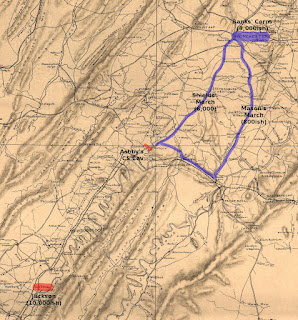March 31, 1862: Gen. David Hunter arrives in Port Royal, So. Carolina, to assume command of the Department of the South, replacing Thomas Sherman. Hunter is tasked with continued operations against Savannah and Charleston.
---The Chicago Times publishes a story about Union troops making a raid in western Tennessee:
Col. Buford, of the Twenty-seventh Illinois, accompanied by his regiment, the Forty-second Illinois, the Douglas Brigade, Col. Roberts, and four hundred of the Fifteenth Wiconsin, Col. Heg, (Scandinavian,) all from Island No. Ten, and two companies of the Second Illinois cavalry, Colonel Hogg, and a detachment of artillery, the last two from Hickman, Ky., made a reconnoissance [sic] in force and descent upon Union City, Tenn; and after a forced march of twenty-four hours, discovered a large force of rebel cavalry and infantry, under the notorious Clay King. The cavalry dashed into the place at a furious rate. The utmost consternation seized the rebels, and they fled in every direction. Several of them were killed, and about one hundred taken prisoners; one hundred and fifty horses were captured, a large amount of forage and spoils, and several secession flags. The National forces returned to Hickman after destroying the tents and other property they could not carry away.
---Surgeon Alfred L. Castleman, serving with McClellan’s army on the Peninsula, notes his skepticism of McClellan’s strategy in his journal:
31st.—To-day, whilst all were expecting orders to move forward, I received orders to build a log hospital. — What can this mean? The weather is beautiful, roads good, troops in fine condition, warm weather coming on, and here we are preparing as for a summer’s stay. God help us and our little General, but put it into his heart not to remain here till the enemy, whom we have found, has time to fortify against our approach. We have been a long time accomplishing nothing. Although the weather is fine, and it is now first of April, not a forest tree has started its buds. I am disappointed, for I expected by this time, in this climate, to be as in midsummer. But even the trees, and nature, seem to linger, and we should not blame our General.
---Lt. Cyrus Hardaway, of the 1st U.S. Sharpshooters (Berdan’s Sharpshooters), serving with the Army of the Potomac, now on the Peninsula, writes home to his mother, expressing the optimism common among the soldiers concerning the coming campaign:
I have been here just a week to day, and have been on picket three times. it suits me exactly we take three or four prisoners every day and sometimes shoot at some when they are so far off that we cant hurt them any. One of the Massachusetts boys got paid last night for not shooting straight enough, a rebel scout crawled up and shot him in the leg but did not hurt him verry bad I have just had a good dinner, out of a secesh pig that the boys killed this morning we lay violent hands on every pig that comes in the way, they have to go a good ways to keep out of the way we get some turkeys and chickens and sometimes oysters and Clams. I spent part of one day in looking over the ruins of Hampton that the rebels burnt last summer. I think it must have been one of the most beautiful towns in the United States before it was burnt. One of the Oldest Churches in America was standing there and that was burnt with the rest The rebels have dug at every corner of it for the corner stone expecting to find some treasure but whether they did or not I cant tell. The town was well fortified on three sides with earth breast works but it seems that it did them no good as they were obliged to leave without making a stand.
You need not be surprised if you hear of Richmond being ours in one more week They will probably not give fight untill they get there. I do not think they can hold that long, there is enough Artillery here now to knock Richmond all to pieces in one day and they keep bringing in more everyday I thought I knew what it was to be a soldier when I left Washington but I find that I did not know anything about it at all We do not have any tents only what we make of our rubber blankets stretched over a stick that keeps the rain off and we keep warm the best way we can it is verry warm and pleasant during the day but the nights are verry cold









